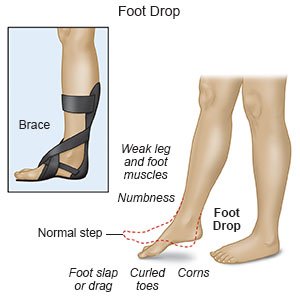Foot Drop
Medically reviewed by Drugs.com. Last updated on Aug 4, 2025.
What is foot drop?
Foot drop is a nerve and muscle problem that prevents you from flexing or lifting your foot. One or both legs may be affected. Foot drop may be temporary or permanent.
What increases my risk for foot drop?
- Crossing your legs, a nerve injury, or using a tight bandage, brace, or cast
- Motor neuron disorders such as amyotrophic lateral sclerosis (ALS) or polio
- Brain disorders such as multiple sclerosis (MS), stroke, or cerebral palsy
- A muscle disorder such as muscular dystrophy
- A genetic condition or a family history of foot drop
- Medical conditions such as diabetes, spinal stenosis (narrowing), or peripheral neuropathy
- A mass pressing on a nerve, or hard leg muscles, such as from playing sports or working out
What are the signs and symptoms of foot drop?
- Numbness in your lower leg and foot
- Trouble walking, lifting, or turning your foot
- Foot and toes that slap or drag on the ground
- A higher step than normal, such as when you climb stairs
- Weak leg and foot muscles
- Curled toes or corns (hard growths) on the ball of your foot
 |
How is foot drop diagnosed?
Your healthcare provider will examine your leg and foot. Tell your provider about your symptoms and when they began. Also tell your provider about your medical conditions, injuries, and family history. You may also need any of the following tests:
- An electromyography (EMG) test measures the electrical activity of your muscles at rest and with movement.
- A nerve conduction study shows how well your nerves work. Your provider will place electrodes (wires) on your body. These send electric currents into the nerve to see how quickly it responds.
- X-ray, ultrasound, CT, or MRI pictures may be used to check for a problem causing your foot drop. Do not enter the MRI room with anything metal. The MRI machine uses a powerful magnet. Metal can cause serious injury from the magnet. Tell the healthcare provider if you have any metal in or on your body.
How is foot drop treated?
Your condition may improve on its own within 6 weeks. You may need any of the following if your symptoms do not improve:
- Functional electrical stimulation gives your nerves and muscles small electric shocks as you walk. This may help your muscles remember to lift your foot when you walk.
- Medicine may be given to decrease nerve pain.
- Surgery may be used to fuse (join) your foot and ankle or to move tendons to the weak area to provide support.
How can I manage foot drop?
- Use an ankle brace as directed. The brace helps retrain your leg to lift your foot. The brace is made of hard plastic and holds your foot in place. This will prevent foot dragging and make it easier to walk.
- Lower your risk for falling. Remove anything you might trip over. Tape electrical cords down. Keep paths clear throughout your home. Make sure your home is well lit. Put nonslip materials on surfaces that might be slippery. An example is your bathtub or shower floor. A cane or walker may help you keep your balance as you walk.

- Go to physical therapy as directed. A physical therapist will teach you exercises to help improve movement and strength, and to decrease pain. The therapist will teach you to shift your body position and stretch your muscles.
When should I seek immediate care?
- You fall and hurt yourself.
- The numbness in your legs and feet spreads or worsens.
- Your pain becomes severe.
When should I call my doctor or neurologist?
- Your symptoms get worse or do not go away.
- You have more trouble walking, dressing, or playing sports.
- You have pain, redness, or swelling.
- You have questions or concerns about your condition or care.
Care Agreement
You have the right to help plan your care. Learn about your health condition and how it may be treated. Discuss treatment options with your healthcare providers to decide what care you want to receive. You always have the right to refuse treatment. The above information is an educational aid only. It is not intended as medical advice for individual conditions or treatments. Talk to your doctor, nurse or pharmacist before following any medical regimen to see if it is safe and effective for you.© Copyright Merative 2025 Information is for End User's use only and may not be sold, redistributed or otherwise used for commercial purposes.
Further information
Always consult your healthcare provider to ensure the information displayed on this page applies to your personal circumstances.
